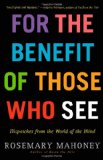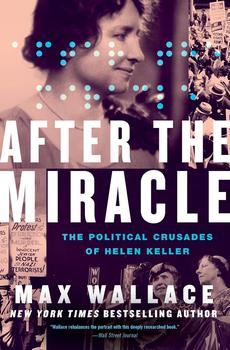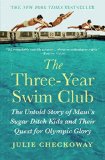Summary | Excerpt | Reviews | Beyond the book | Read-Alikes | Genres & Themes | Author Bio

Dispatches from the World of the Blind
by Rosemary MahoneyAt the beginning of Rosemary Mahoney's For the Benefit of Those Who See, the author admits to a "morbid fear" of losing her eyesight and recalls a time in her youth when she suffered a deeply torn cornea after being hit by her friend's racquet during a squash game. "Lying in my bed that terrible night thirty years ago," Mahoney writes, "I concluded that being blind was worse than being dead. Being blind was like lying alive within a locked coffin…I'd be imprisoned that way for the rest of my pointless life, conscious of my predicament and helpless to change it."
Mahoney's eye healed after several weeks, but the dread of losing her sight remained and was coupled with "the usual pity for people who couldn't see," she writes. In 2005, while Mahoney was in her forties, an American magazine sent her to Tibet to write an article about Sabriye Tenberken, the blind German woman who, along with her sighted Dutch partner, Paul Kronenberg, founded Braille Without Borders, Tibet's first school for the blind (see 'Beyond the Book'). After spending time with Tenberken and a number of blind students, Mahoney became strongly curious about the world of the blind – an interest that stayed with her for years. To learn more, she spent three months in 2009 teaching English to blind and visually impaired adults at the International Institute for Social Entrepreneurs in Trivandrum, India. The IISE, now known as kanthari, is an offshoot of Braille Without Borders and helps the blind and people with a variety of other life challenges.
Humbled and illuminated, Mahoney wrote about her experiences in this stunning book, which melds reportage with science and a compelling history of blindness. Just as in her previous works (including Down the Nile: Alone in a Fisherman's Skiff and The Singular Pilgrim: Travels on Sacred Ground), her daring, adventurous spirit and disarming honesty are evident throughout, resulting in a riveting read that's educational without ever being pedantic.
Early on, we learn that Tibetan culture is fraught with superstition, mythologies, ghosts, and spirits. Many Tibetans believe blindness is caused by mysterious powers or spiritual forces as punishment for misdeeds perpetrated in a past life. "The blind are considered to be cursed, possessed by demons, or capable of extrasensory perception, which makes them entirely dangerous," Mahoney writes. "For centuries Tibet's blind have been shunned, vilified, treated as subhuman, and subjected to unimaginable cruelty."
Several students at the school (free for any motivated blind student who presents himself at the door) are living proof of these deep-set prejudices and horrific practices. Just one example Mahoney notes is a blind girl who, shortly after arriving, wonders why everyone at the school is nice when the people back in her native village had thrown stones at her (although Mahoney's book centers primarily on blindess, it's important to note that it is not the only disability regarded with such disdain in Tibet). Rather than brood about their blindness, the students thrive in the new surroundings. Mahoney is amazed by their resilience and even questions how they can be so accepting of their fate, so hopeful and eager to learn. "Some of them had been abandoned by their families, some beaten, some tied to furniture," she writes. "Where did the cheerfulness come from?...Was it that they had, purely by chance, been found by someone who saw beneath the surface of them, who knew that behind their dull eyes, a whole universe of thought was simmering, waiting to be given a chance?"
During Mahoney's stint at the IISE in India, she meets students from across the globe – including Saudi Arabia, Norway, Africa, and Japan. They share their professional aspirations and personal, often harrowing stories that encompass, among other horrors, the Liberian civil war. Here, too, with many of the blind people Mahoney comes to know, she realizes "there were sadnesses and tragedies far more painful than the failure of their eyes. For most of them, their blindness was not psychologically, or even practically, their greatest hardship."
With vivid prose, Mahoney recounts her ongoing discovery of the world of the blind, which becomes clearer to her at a few pivotal junctures in the book. For example, during a dark night's walk with Tenberken in India, Mahoney is unable to see what dangerous wildlife may be lurking in the shadows. In yet another scene, Mahoney agrees to be blindfolded and led through the busy streets of Lhasa by two blind teenage girls. In this situation, Mahoney finds herself nervous and dependent at first. These apprehensions gradually give way to astonishment at the capabilities, intelligence and humor of her blind guides. Using canes and the other four senses (the smell of incense indicates they're near the Jokhang Temple for instance), they smoothly navigate the streets, making appropriate turns as needed.
The book also has a frightening, but fascinating, section that focuses on the results many blind people have reported after surgically regaining their sight. Without revealing too much here, Mahoney's examination of case studies discloses the reality that gaining sight after a lifetime of blindness is not, as she puts it, "the miraculous revelation we might suppose it to be."
For the Benefit of Those Who See is a compassionate, remarkable book that offers a rare and insightful look at blind culture. The history and stories Mahoney presents are often shocking and disturbing but also reflective of human dignity, intelligence, determination, and triumph.
![]() This review was originally published in The BookBrowse Review in March 2014, and has been updated for the
March 2015 edition.
Click here to go to this issue.
This review was originally published in The BookBrowse Review in March 2014, and has been updated for the
March 2015 edition.
Click here to go to this issue.

If you liked For the Benefit of Those Who See, try these:

by Max Wallace
Published 2024
In this powerful new history, New York Times bestselling author Max Wallace draws on groundbreaking research to reframe Helen Keller's journey after the miracle at the water pump, vividly bringing to light her rarely discussed, lifelong fight for social justice across gender, class, race, and ability.

by Julie Checkoway
Published 2016
The inspirational, untold story of impoverished children who transformed themselves into world-class swimmers.
Your guide toexceptional books
BookBrowse seeks out and recommends the best in contemporary fiction and nonfiction—books that not only engage and entertain but also deepen our understanding of ourselves and the world around us.